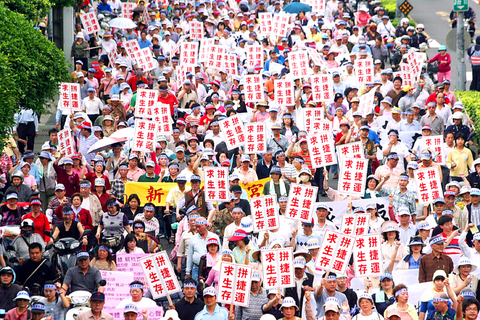Thousands of protesters staged a demonstration in a Taipei County suburb yesterday to voice their support for the demolition of Lo Sheng Sanatorium and the mandatory eviction of its residents next month.
Sinjhuang is home to Lo Sheng Sanatorium, where thousands of people with Hansen's disease were once quarantined for life.
A plan to tear down most of the buildings on the 17-hectare site to make room for a Mass Rapid Transportation (MRT) depot has met with strong opposition.

PHOTO: WANG YI-SUNG, TAIPEI TIMES
Earlier this month, Taipei County authorities posted an eviction notice for Lo Sheng's residents ahead of the construction work.
A crowd, mobilized by lawmakers elected from the district and local politicians, marched from Sinjhuang City Hall to Lo Sheng Sanatorium while chanting slogans and holding up signs yesterday.
"We want the MRT for our survival!" Demonstrators shouted along the way.
The crowd consisted of around 8,000 people, police estimated.
The demonstrators said that the completion of an MRT line connecting Sinjhuang to Taipei was critical to the city's economic prosperity.
"Our hopes for improvement in Sinjhuang's economy lie in the MRT line, and we want no more delays," said Chang Lu-jui (
Chang and many other demonstrators say the controversy over Lo Sheng's preservation is responsible for delays in the completion of the MRT line.
"We the people of Sinjhuang have treated the lepers well enough, now they have to give in and make a sacrifice for the public," Chang said.
Taipei County Commissioner Chou Hsi-wei (
"We've waited for three years, do we want to wait any longer?" Chou asked the demonstrators in front of the Lo Sheng sanatorium.
In his speech, Chou also rejected a plan that aims to preserve 90 percent of buildings in the sanatorium while extending the construction period by only three to four months.
"The students [who support Lo Sheng's preservation] said that the 90 percent plan would only extend the construction period by three to four months," he said. "But it'll take at least one year or even longer."
The 90 percent preservation plan was proposed by some construction specialists in Taiwan based on evaluations by a UK construction consultant firm.
Supporters of Lo Sheng's preservation said yesterday they'd like to see the completion of the line.
"Of course we want to see the completion of the MRT line, it's good for everyone, that's why we called an open review of the 90 percent preservation plan," a preservationist said.
But Chou took the hard line.
"We posted a notice [for demolition] on March 16. When the deadline comes on April 16, the county government will act according to the law unless the Executive Yuan decides otherwise," Chou told the crowd.
also see story:
Why Lo Sheng must be preserved

The first global hotel Keys Selection by the Michelin Guide includes four hotels in Taiwan, Michelin announced yesterday. All four received the “Michelin One Key,” indicating guests are to experience a “very special stay” at any of the locations as the establishments are “a true gem with personality. Service always goes the extra mile, and the hotel provides much more than others in its price range.” Of the four hotels, three are located in Taipei and one in Taichung. In Taipei, the One Key accolades were awarded to the Capella Taipei, Kimpton Da An Taipei and Mandarin Oriental Taipei. Capella Taipei was described by

EVA Airways today confirmed the death of a flight attendant on Saturday upon their return to Taiwan and said an internal investigation has been launched, as criticism mounted over a social media post accusing the airline of failing to offer sufficient employee protections. According to the post, the flight attendant complained of feeling sick on board a flight, but was unable to take sick leave or access medical care. The crew member allegedly did not receive assistance from the chief purser, who failed to heed their requests for medical attention or call an ambulance once the flight landed, the post said. As sick

The Taichung District Court yesterday confirmed its final ruling that the marriage between teenage heir Lai (賴) and a man surnamed Hsia (夏) was legally invalid, preventing Hsia from inheriting Lai’s NT$500 million (US$16.37 million) estate. The court confirmed that Hsia chose not to appeal the civil judgement after the court handed down its ruling in June, making the decision final. In the June ruling, the court said that Lai, 18, and Hsia, 26, showed “no mutual admiration before the marriage” and that their interactions were “distant and unfamiliar.” The judge concluded that the couple lacked the “true intention of

INDUSTRY: Beijing’s latest export measures go beyond targeting the US and would likely affect any country that uses Chinese rare earths or related tech, an academic said Taiwanese industries could face significant disruption from China’s newly tightened export controls on rare earth elements, as much of Taiwan’s supply indirectly depends on Chinese materials processed in Japan, a local expert said yesterday. Kristy Hsu (徐遵慈), director of the Taiwan ASEAN Studies Center at the Chung-Hua Institution for Economic Research, said that China’s latest export measures go far beyond targeting the US and would likely affect any country that uses Chinese rare earths or related technologies. With Japan and Southeast Asian countries among those expected to be hit, Taiwan could feel the impact through its reliance on Japanese-made semi-finished products and